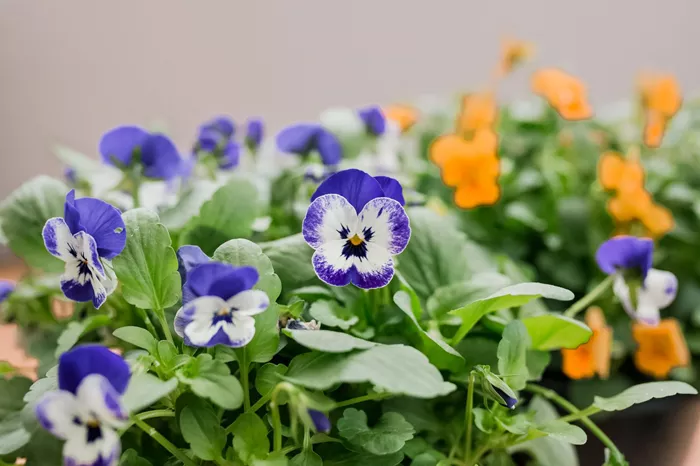Viola plants, commonly known as pansies, are cherished for their vibrant colors and pleasant fragrance. They are often planted in gardens, hanging baskets, and window boxes to add beauty to outdoor spaces. However, as much as we adore these flowers, pet owners, especially those with dogs, may be concerned about their safety. The question arises: Are viola plants poisonous to dogs?
Understanding the potential risks of certain plants is essential for dog owners who want to create a safe environment for their pets. Some flowers, though beautiful, may have compounds that could cause harm to dogs if ingested. In this article, we will explore whether viola plants are toxic to dogs, what symptoms to watch out for, and what you should do if your dog consumes them.
What Are Viola Plants?
Viola plants belong to the Violaceae family and are closely related to pansies. They come in a variety of colors, including purple, yellow, white, and blue, and they are often used to brighten gardens and landscapes. Viola plants are known for their distinct rounded petals and heart-shaped leaves. They are hardy flowers, thriving in cooler climates, and can bloom throughout the year in certain regions.
Despite their visual appeal, it’s important to consider the safety of any plants you keep in your garden, particularly if you have pets that like to explore and nibble on plants.
Are Viola Plants Poisonous to Dogs?
Viola plants are not considered toxic to dogs. According to experts, pansies and violets are generally safe for pets, including dogs. This means that if your dog decides to chew on a viola plant, it is unlikely to cause any serious harm or poisoning.
However, just because a plant is not toxic does not mean it is entirely harmless. Eating large amounts of any plant, including violets or pansies, could potentially cause mild gastrointestinal issues in dogs, such as vomiting or diarrhea. This can happen with any plant material that the dog’s digestive system is not accustomed to.
Why Are Some Plants Toxic to Dogs?
Certain plants contain compounds that are harmful to dogs. For example, many plants have substances like saponins, alkaloids, or glycosides, which can cause poisoning if ingested. Symptoms of poisoning vary depending on the plant, but they often include vomiting, drooling, diarrhea, lethargy, and, in severe cases, organ failure.
Fortunately, viola plants do not contain these harmful compounds, making them a safer choice for pet owners who want to decorate their gardens with flowers.
What Should You Do If Your Dog Eats Viola Plants?
Even though viola plants are not toxic to dogs, it’s still a good idea to monitor your pet closely if they have eaten some. The most common reaction to consuming flowers, including pansies and violets, is mild digestive upset. If your dog shows signs of discomfort, such as vomiting or diarrhea, it’s important to provide them with fresh water and keep an eye on their behavior.
If the symptoms persist or if your dog seems unusually lethargic, it’s always best to consult your veterinarian. They can give you specific advice based on the amount of plant material ingested and your dog’s overall health.
How to Keep Your Dog Safe Around Plants
While viola plants are safe, it’s always a good practice to ensure that your dog does not have easy access to potentially harmful plants. Here are a few tips to help you create a safe garden:
Choose dog-friendly plants: Make sure that the flowers and plants in your garden are non-toxic to dogs. There are many plants that are safe for pets.
Supervise your dog: If you are introducing new plants into your garden, monitor your dog’s behavior to ensure they don’t nibble on anything they shouldn’t.
Use barriers: If your dog is particularly curious, consider using barriers or fencing to keep them away from flower beds or specific plants.
Provide alternatives: If your dog enjoys chewing on plants, provide them with safe alternatives like dog-friendly grass or pet-safe chew toys.
Conclusion
In summary, viola plants, including pansies and violets, are not toxic to dogs. While they are safe for dogs to interact with, it’s still wise to monitor your pet’s behavior if they decide to chew on them. Most dogs may experience mild stomach upset from ingesting any plant material, but viola plants do not pose a significant risk. Keeping a well-maintained garden and being aware of which plants are safe for pets can help ensure that your dog stays healthy and happy.
If you have concerns about your dog eating flowers or plants, it’s always best to contact a veterinarian for guidance.
FAQs About Viola Plants
1. Are all varieties of viola plants safe for dogs?
Yes, all varieties of viola plants, including pansies and violets, are non-toxic to dogs. However, it’s still important to keep an eye on your pet to ensure they don’t eat too much of any plant.
2. Can viola plants cause allergic reactions in dogs?
It’s rare, but some dogs may be allergic to certain plants. If your dog shows signs of an allergic reaction, such as itching, redness, or swelling, you should consult a vet.
3. How do I prevent my dog from eating plants in my garden?
Consider using fencing or barriers to protect your plants. You can also redirect your dog’s attention by offering chew toys and other safe alternatives.
4. What should I do if my dog eats a lot of viola plants?
If your dog eats a large amount of viola plants and shows symptoms like vomiting or diarrhea, monitor their condition and provide fresh water. Contact your vet if symptoms persist.
5. Are there any plants that look like violets but are toxic to dogs?
Yes, there are some plants that resemble violets but are toxic to dogs, such as the Deadly Nightshade (Atropa belladonna). Always research a plant before adding it to your garden if you have pets.


